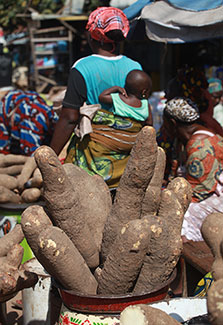Focus on NCDs: Examining diet's role in NCDs in Nigeria
November / December 2017 | Volume 16, Issue 6

©Akintunde Akinleye/NURHI,
Courtesy of Photoshare
A woman carrying her baby walks in front
of yam tubers in Nigerian market.
By Karin Zeitvogel
Trainees in Nigeria have developed tools that will help researchers to scientifically determine if dietary changes are contributing to the rise of noncommunicable diseases in the West African country. Supported by a Fogarty Chronic, Noncommunicable Diseases and Disorders Across the Lifespan (NCD-Lifespan) grant awarded to the University of Maryland, Baltimore (UMB), a team of researchers in Nigeria developed a food frequency survey that allowed them to quantify the portion sizes of foods and beverages consumed in Africa - a tough task on a continent where there are no standard serving sizes.
Working with U.S. and Nigerian mentors, the trainees then converted the portion size reports into macro- and micro-nutrients, and discovered the diet of city-dwelling Nigerians has undergone a major change. They found that the most common source of carbohydrate consumed by urban Nigerians was no longer the traditional staple of high-fiber mashes of root vegetables and tubers, but white rice - more expensive than the traditional foods but easier and quicker to prepare.
The researchers also found that 63 percent of Nigerian city-dwellers are overweight or obese. In a publication, the scientists note the results are "a reflection of the sedentary lifestyle, which is now prevalent in most cities in Nigeria."
Launched in 2014, UMB's NCD-Lifespan program is also providing training in breast cancer epidemiology to determine why so many women in Nigeria present with late-stage cancer.
"We believe that hands-on training is the best way to develop research capacity in Nigeria," program lead and UMB professor, Dr. Clement Adebamowo, said. "Our program allows our trainees to address some of the main questions relating to NCDs in a local, relevant context. The benefits hugely outweigh the costs, and are an excellent example of the soft-power value of organizations like Fogarty."
More Information
To view Adobe PDF files,
download current, free accessible plug-ins from Adobe's website.